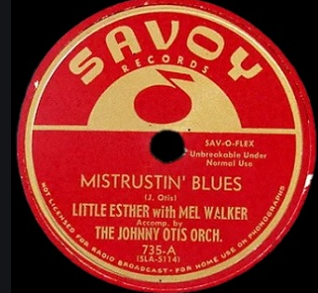This article relies largely or entirely on a single source .(February 2023) |
Billboard Top R&B Records of 1950 is made up of two year-end charts compiled by Billboard magazine ranking the year's top rhythm and blues records based on record sales and juke box plays. [1]
| Retail year-end [1] | Juke box year-end [1] | Title | Artist(s) | Label |
|---|---|---|---|---|
| 1 | 2 | "Pink Champagne" | Joe Liggins and His "Honeydrippers" | Specialty |
| 2 | 4 | "Double Crossing Blues" | Johnny Otis Quintette (vocals by The Robins and Little Esther) | Savoy |
| 3 | 10 | "I Need You So" | Ivory Joe Hunter | M-G-M |
| 4 | 20 | "Hard Luck Blues" | Roy Brown | Deluxe |
| 5 | 8 | "Cupid's Boogie" | Little Esther (with Mel Walker and Johnny Otis Orchestra) | Savoy |
| 6 | 1 | "I Almost Lost My Mind" | Ivory Joe Hunter | M-G-M |
| 7 | 11 | "Well Oh Well" | Tiny Bradshaw | King |
| 8 | 9 | "Blue Light Boogie" | Louis Jordan | Decca |
| 9 | 3 | "For You My Love" | Larry Darnell | Regal |
| 10 | 15 | "Mistrustin' Blues" | Little Esther, Mel Walker (accompanied by The Johnny Otis Orchestra) | Savoy |
| 11 | 5 | "Every Day I Have the Blues" | Lowell Fulson | Swingtime |
| 12 | 6 | "Blue Shadows" | Lowell Fulson | Swingtime |
| 13 | 13 | "Anytime, Any Place, Anywhere" | Joe Morris | Atlantic |
| 14 | 14 | "Why Do Things Happen to Me?" | Roy Hawkins | Modern |
| 15 | 7 | "Mona Lisa" | Nat King Cole | Capitol |
| 16 | NR | "I Wanna Be Loved" | Dinah Washington | Mercury |
| 17 | 12 | "Please Send Me Someone to Love" | Percy Mayfield | Specialty |
| 18 | NR | "I Love My Baby" | Larry Darnell | Regal |
| 19 | 23 | "Saturday Night Fish Fry" | Louis Jordan | Decca |
| 20 | NR | "Cry, Cry, Baby" | Ed Wiley | Sittin' In |
| 21 | 24 | "Teardrops from My Eyes" | Ruth Brown | Atlantic |
| 22 | 25 | "Love Don't Love Nobody" | Roy Brown | DeLuxe |
| 23 | 16 | "The Fat Man" | Fats Domino | Imperial |
| 24 | NR | "My Baby's Gone" | Charles Brown | Aladdin |
| 25 | 18 | "Information Blues" | Roy Milton | Specialty |
| 26 | NR | "I'm Yours to Keep" | Herb Fisher | Modern |
| 27 | 29 | "It Isn't Fair" | Dinah Washington | Mercury |
| 28 | 22 | "I'll Get Along Somehow" | Larry Darnell | Regal |
| 29 | NR | "Bad, Bad Whiskey" | Amos Milburn | Aladdin |
| 30 | NR | "Deceivin' Blues" | Little Esther and Mel Walker (with Johnny Otis Orchestra) | Savoy |
| NR | 17 | "Rag Mop" | Lionel Hampton | Decca |
| NR | 19 | "I'll Never Be Free" | Paul Gayten, Annie Laurie | Regal |
| NR | 21 | "Three Times Seven" | Jewel King | Imperial |
| NR | 26 | "I Quit My Pretty Mama" | Ivory Joe Hunter | King |
| NR | 27 | "Rag Mop" | Doc Sausage | Regal |
| NR | 28 | "School Days" | Louis Jordan | Decca |
| NR | 29 | "It Isn't Fair" | Dinah Washington | Mercury |
| NR | 30 | "Sittin' on It All the Time" | Wynonie Harris | King |




